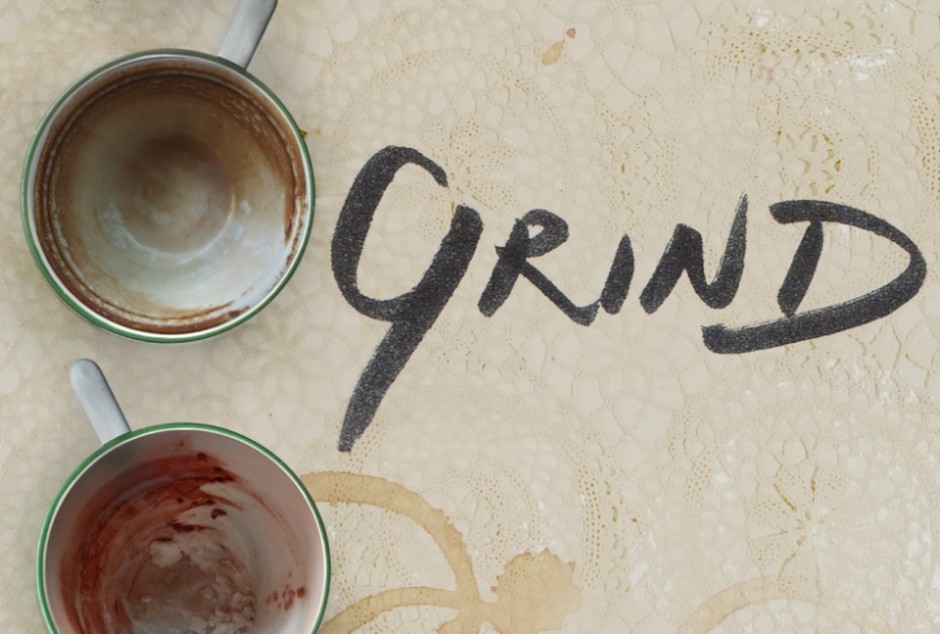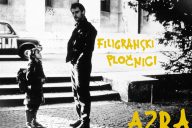Would you like some prophecy with your coffee? An excerpt from the novel GRIND by Ed Vukovic
We are proud to present an excerpt from Grind, the recently published novel by Shoot Farken alumni Ed Vukovic. Grind is available as a Kindle edition and it can be purchased via Amazon.
A brief description of Grind by the author
Ziva’s love of coffee is double-edged; by ‘reading’ coffee, Ziva predicts the future with chilling accuracy, but always as a service to others. Having fled the economic aftershocks of the Balkan War, she clings to this ancient ritual passed on by her grandmother. She misses home, resents being ‘forced’ to leave and now that she is in Australia, in search of a better life, her brother is forcing her to leave once again. Against her better judgement, Ziva reads for herself and what she sees will change her life irrevocably.
The Excerpt
Standing in the hallway, the door closed behind me, I take in a breath, holding it in as long as I can, and let it out again, the bitter air stinging my tongue. I can’t stand it when Ivan talks about Baba. It saddens me that he hates her so. He always did. He distrusted her. I think because the other boys in the village used to tease him for having a gypsy grandmother. They would hound him; throw stones at him, chanting that he was the bastard child of Baba Yaga the witch and he’d fly into a rage, beating at them until his eyes filled with tears. Years of being bullied and teased about Baba Zlata taught him how to fight. But Baba Zlata wasn’t a gypsy. Nor was she a witch. She just had the gift, or the curse, depending on how you viewed it.
I remember the last time I saw her read, just before she died. I was very young, maybe nine or ten and it was the only time I saw her read properly. I was a child and didn’t really pay attention to grown up things. And besides, my mother didn’t like me being around Baba too much. I’m not sure why exactly but I think maybe Baba didn’t approve of my mother and was forthright in letting her know this. My mother cursed when my father would tell her that Baba was coming for dinner. Partly because she would have to work harder to clean the house and cook to Baba’s standards, but I also think because she just didn’t like her and just hated being in her presence. I don’t think she trusted Baba either. So for me, each visit to Baba’s house was treasured.
I remember it was winter and it was very cold and Baba was ill more and more those days. I asked my parents if I could visit my grandmother, help her while she was ill, because I was worried that the cold weather would be too much for her. My mother wasn’t very keen on this idea but my father thought it was a wonderful gesture.
Baba’s house was small and sparse. She didn’t decorate it as other women did. Baba liked her house to be clean and less stuff made it easier to keep it that way. No doilies or ‘mingeri gingeri’ adorning cabinets or mantelpieces, except for a solitary black and white photograph on the mantel. My Dedo. He is a handsome man, in his early twenties, tall and strong, with dark, intense eyes. Dedo Milan. He died in the war.
I remember sitting in a chair, my fingers clasped gently around a small, chipped tea-cup. They caressed it, sliding over its curves, along its ridges, intrigued by the warmth radiating through the china. I smiled and gazed at Baba. Her cow-brown eyes, lined with wrinkles, peered curiously at me over her glasses. I remember blushing, as if guilty of touching something I shouldn’t. My hands leapt from the table and into my lap but Baba just smiled, motioning for me to take the cup in hand again.
Stillness filled the room. Silenced by the murmur of boiling water, it seemed to be waiting. Baba sighed, shifting her weight momentarily, her calloused hands rubbing themselves slowly, assuredly. She leaned towards the fireplace, her head bowing, a wisp of hair escaping her scarf, and picked up the kettle. Baba didn’t believe in electric stoves. She said the drink should be made with real flames. It was more natural. The warmth of the hearth tickled her fingertips, bringing a smile to her face. She sat back down at the table and placed the kettle almost ceremoniously upon it.
I sat still, daring to talk, to ask questions, following my grandmother’s slow, methodical movement. Columns of steam rose from the kettle, sliding up to the ceiling. Baba brushed aside her greying hair and delicately poured hot liquid into the same cup I had been playing with. It flowed black, splashing against the gleaming ceramic. Darkness flooded the cup, blocking out the bright, shining veneer. She leaned back in her chair, looked up at me and smiled. We sat for a minute or two in silence. I inhaled, inviting the sweet aroma in. Baba placed the pot back down on the table and waited patiently.
I took the cup, marvelling at how warm it felt in my hands and took a sip. The coffee slid down my throat, twisting like a panicked snake, engulfing my senses. I wanted it desperately, needed it, to warm me, to understand what it was like, to learn. Baba always let me drink coffee, despite my parents forbidding it, and I always felt guilty for doing so. She nodded and poured herself a cup, letting it sit for a moment, letting it breathe. She massaged one knotted hand with the other as I watched, delicately sipping the liquid dark in my cup, recoiling each time the heat touched my lips. With a wince, Baba flexed her hands, picked up her cup and drained the contents in a single gulp. The coffee must still have been incredibly hot but this didn’t seem to worry her. She then placed the cup facedown on a clean, white cloth that I hadn’t noticed before.
“It needs to dry,” she said, and after a minute or so, lifted the cup, revealing an intricately woven storyboard smeared over the small porcelain canvas. “Finish your coffee Ziva, then I can teach you.”
I took another sip but the coffee was still too hot. Baba Zlata clucked her tongue and looked like she was about to start talking when a knock at the door stole her attention. “Get the door child, we have visitors,” she said waving her hands.
I did as she said; knowing that asking me again would inflame her temper. In my haste, I bumped against the corner of the table, bruising my thigh instantly. Moaning, I opened the door and found a young couple on the doorstep, shadowed by the chill of the night. They stepped inside without acknowledging me at all, as if I were a ghost. The young man took off his hat, revealing a kind and handsome face under a mop of black wavy hair. His wife was pregnant, her round belly, comforted by a blanket, protruded from her coat. The baby was near, maybe only a few weeks or so to go. The man smiled as he gave me his coat and sat by his wife at the table. They exchanged greetings with my grandmother, holding each other’s hands firmly, anxiously.
“Sasho, what brings you and your lovely wife to my house this cold night? She is in no condition to be taken out in this weather. What is on your mind?” Baba Zlata demanded, smiling at the man opposite her.
“I know it is late and cold Baba Zlata, but there has been a pain growing in my heart. I must know if our child will be safe and strong. I want a son Baba Zlata, a good and healthy boy. I need to…” The man spoke quickly, nervously stumbling over his words, unsure how to finish.
“Why come to me Sasho? Surely the doctors can tell you the condition of your child. They are skilled in the arts of medicine, I am but an old woman and know nothing of these matters,” she chuckled, shaking her head.
Sasho lowered his head, ran his fingers through his hair and glanced at his wife who was gently, rhythmically rubbing her stomach.
“I’d rather you told me why I came,” he sighed finally, hunched over the table. Baba Zlata nodded, grinning, her face illuminated momentarily by the flickering firelight.
“Ziva, come and fetch me my blanket. It is cold in here,” the old woman asked, readying herself.
Sitting in the corner, masked by shadow, I picked up an old embroidered blanket that was folded on a chest beside me and gave it to my grandmother. The blanket was heavy with age, the pattern, swirls of red and orange, yellow and green, was perfectly symmetrical. It was soft and warm to the touch. A single black eye stitched perfectly into its centre seemed to glare at me through the darkness. Baba Zlata took it and nodded for me to sit beside her, placing it across her lap. She seemed to wink down at the black eye draped over her legs and waited patiently for me to take my place.
There were now two extra cups waiting on the table, for visitors that were not expected. When Baba put them there, I don’t recall. She could move quickly for an old woman. I remember wondering what it was that Sasho and his wife wanted, wondering what Baba Zlata would see, but more importantly, what she would say. I had seen Baba read before but had never really paid attention. I liked visiting Baba Zlata because she let me drink coffee, because her house was always warm and she told magical stories. She also baked the best apple pide in the village. It was only now, that I was older and started to understand the stories about her, that I became interested in Baba and not just her pie.
Baba poured a steady stream of coffee into the waiting cups, splashing it over the china, masking the tiny cracks of time. Sasho and his wife sat watchful, he tried to stifle a nervous cough. Coffees poured; my grandmother motioned for me to remove the pot, and with a nod of her head, instructed Sasho to drink.
He did as he was told and his lips, blue with cold, reddened swiftly as the coffee trickled down his throat, warming his belly.
“It is a good one this one,” Baba Zlata remarked, pouring herself another cup. “I mixed flavours, added a little something to it.” She told me later that she never read her own cup. She didn’t need to learn about her future. I remember asking her why and she told me that she already knew it. She took a sip and waited for the couple’s reaction. Following her cue, Sasho sipped from his own cup again and looked up at Baba, a question on his lips.
“Is it almond?” he supposed, hopeful. My grandmother shook her head gently, finishing her share.
“No Sasho, it’s too sweet,” Sasho’s wife said. “Is it cocoa Baba Zlata?” She guessed, taking another sip. Baba nodded. “Cinnamon too I think.”
“Do you like it? I thought a little extra sweetness and spice would add to it tonight, after all, the cold weather begs for something warm and agreeable. Well done Maria, now twirl your cup slowly, allowing the remnants to cover the white. The more you cover the more can be read.”
Both Sasho and Maria did as they were told, the cups all but covered by thick brown residue.
“Now place them upside down on the saucers. They must dry, like any canvas must,” Baba Zlata instructed, her smile never wavering.
I sat in the dancing shadows behind them, closer to the fire, watching excitedly. What would Baba see? I thought. What tales will she tell of Sasho and his wife? I think I wanted to know the baby’s fate, as much as, if not more, than its parents did. But in particular, I wanted to absorb everything, to understand how Baba did what she did. I wanted to learn how to read myself. Baba Zlata told me that I could once, when I was helping her cart some firewood into her house. She said that I had it in me and that when I was ready, she would teach me. But only if I would help out around the house, like I was then, help with some chores as she was but an old woman who couldn’t manage anymore. She also promised to make me coffee and pastries. I said yes instantly, despite my mother’s warnings.
I watched as the three adults crouched conspiratorially over the table, over the untold secrets of their lives. Baba Zlata took Sasho’s cup and twisted it slowly in her hands. She waved her hand above it, crisscrossing over it; a sign of divinity. Peering into the cup, she murmured thoughtfully, nodding then shaking her head.
“Sasho,” she said suddenly, startling all of us. “I see a man standing on a platform, his head hidden by shadows.” Sasho shifted in his seat while Maria squeezed his hand. “Beside him is a large horse, its leg is broken. And over here, look,” Baba whispered, pointing with her little finger as she held the cup so Sasho could see for himself. “Here is the letter T. Do you know anyone of this name, any men who work with animals, a vet or a farmer perhaps?” Sasho shook his head, his brow furrowed with thought.
I craned my neck from the shadows behind my grandmother, straining to see what was inside that cup. And as if she knew what I was trying to do, Baba hunched over the table more, obscuring whatever small view I had.
“What does that mean Baba Zlata? What are you telling me?” Sasho’s eyes were desperate.
“I see wasted effort, as if you have been striving hard to achieve something, straining with all of your heart and no matter how hard you work you cannot reach it. You are limiting yourself by trying too hard, by breaking yourself.”
“I have been working hard to start a new business, my father wants me to take over the butcher’s shop, but I do not want to do it his way. I have been working long hours and have been away from Maria a lot, repairing the shop.”
“It’s true, hard work sustains us but you need to be careful Sasho, sometimes we can extend ourselves too far,” my grandmother muttered, as if talking to someone else. “Now place your third finger on your right hand into the middle of the cup and press firmly. As you do, make a wish.” She gave the cup back to Sasho, his face aching with anxiety, beaded with sweat. The fire was warm, but not that warm.
Sasho closed his eyes and did as Baba told him, giving the cup back to her. I noticed his fingertip was stained black. She clucked her tongue as she examined the cup.
“I see a large cloud, grey and heavy with rain. It shifts in the sky and lies in wait, as if it is a hunter, waiting for his quarry. Underneath sits a cat, coal black, with a white streak across its nose and it is bearing its teeth. There is another figure, masked by shadow. Hmm…” she murmurs. “He is holding a knife, menacing, as if he means to harm you. Do you know anyone who has something against you, this T man perhaps?”
“None, no one. I am a peaceful man, I don’t start quarrels with anyone. I don’t know who it could be,” Sasho pleaded, wiping his brow with his sleeve. “I don’t understand what that means Baba Zlata? Is my business at risk?”
“Beware Sasho, that is all I can say. Someone means to do you harm. Just be careful and watch over your family,” she warned, placing the cup on the table. “Ziva, pour me another girl, my old bones need more warmth. “Now Maria,” she said turning to the young woman, “what do you have for me?”
I remember watching as my grandmother performed the ritual again. Maria sat with her husband, always patting her belly, protecting it, as if the baby may fall out at any moment. Baba turned the cup, examined it, delved deep into its secrets. Maria’s secrets. She asked her questions, fishing for answers. Maria answered, never letting go of her husband’s hand. He watched her lovingly, hopeful that her reading may shed light on his questions as well as hers. Baba instructed Maria to make a wish and as Maria pushed her finger into the cup, Baba turned to me, smiled and winked, a twinkle in her eye. She told the couple what lived in the murky confines of the cup, delivered a final sermon for them both to be careful and watchful. Finished, they stood and thanked Baba and gave her an envelope. Baba smiled and bid them farewell, demanding they look after each other and the beautiful boy that would be born in the next fortnight. Before the couple could speak, Baba closed the door and chuckled. She sat beside me again and asked me to put some more wood on the fire. She was feeling cold.
“So Ziva, what do you think happened here?” She asked me, again massaging her hands.
“You saw something in their cups and it didn’t matter how you asked them, they couldn’t understand what you meant?” I ventured, hoping I understood. Baba smiled.
“Hoh! Look at this one. Very good my girl. You’re a natural!” I was beaming. “But, it isn’t that they didn’t understand Ziva.”
“What do you mean Baba?”
“See my child; I think that they did understand. Or at least, one of them did,” she whispered, leaning towards me, sharing her secret. I wasn’t sure what she meant. What did she mean one of them understood? She could see that I didn’t comprehend what she meant. “Remember when I asked both of them about a man with a name beginning with T?” I nodded. “Now, I know Sasho doesn’t know anyone with a T. It is a small village and I know everyone here. But…” she paused. “Maria does know someone. And I think she knows I know.”
“Who Baba? Who?” I gasped, excited by this revelation. My grandmother repositioned the blanket on her lap, grinning like a cat.
“The women at the market have been gossiping about this for months now,” she started, her voice full of mischief. “They say that Maria has been with another man. A Serbian from Novi Sad. A musician I’m told. Tomislav I think he is called,” she cackled as my mouth fell open in astonishment. “And that’s not all Ziva my girl.”
“What else is there?” I asked incredulous. My grandmother sat back in her chair, her hands in her lap, preventing the blanket’s black eye from seeing.
“The child is not Sasho’s,” she added triumphant.
GRIND is available as a Kindle edition and it can be purchased via Amazon.
















